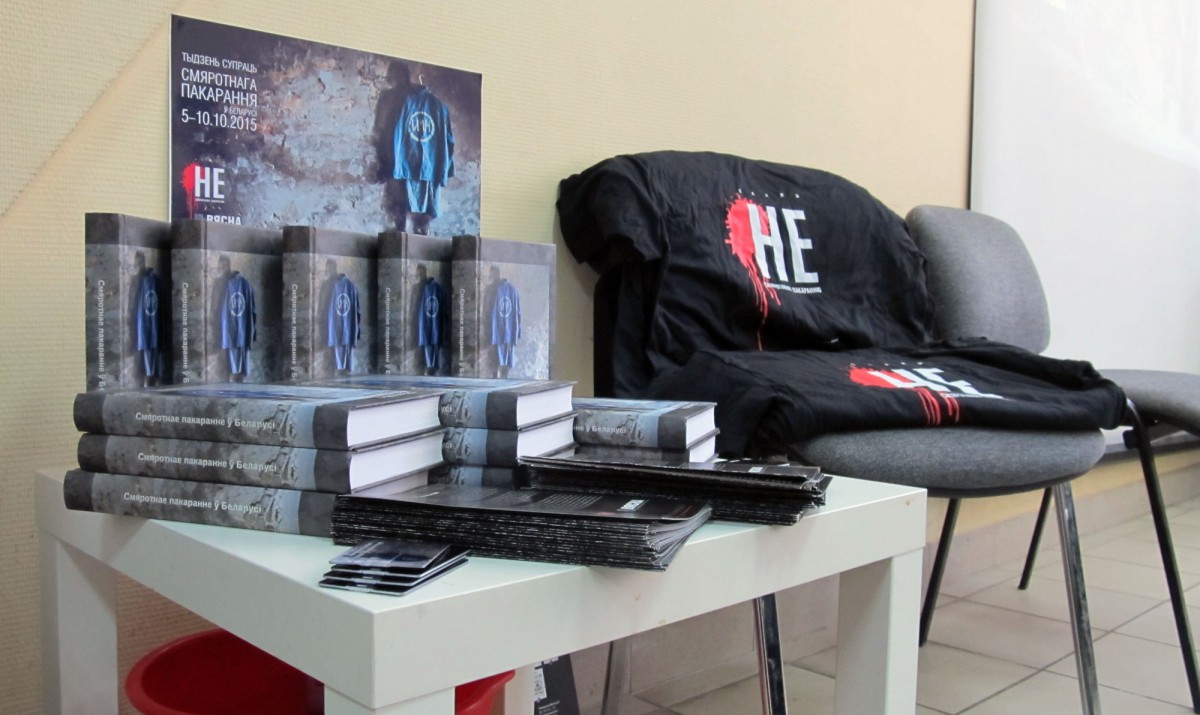Human rights activists presented the book "Death Penalty in Belarus"
October 9 in Minsk, the Human Rights Center "Viasna" presented the documentary book "Death penalty in Belarus" which contains information on the issue since 1998 till today.
Among the peculiarities of the book there is a peculiar review of the history of the death penalty in Belarus, prepared by the historian and journalist Dzianis Martsinoich, as well as a large interview with the former head of remand prison No. 1 in Minsk Aleh Alkayeu, under whose leadership about 150 sentences were executed.
The compendium was created in the framework of the campaign "Human Rights Defenders against the Death Penalty in Belarus", launched in 2009. However, human rights activists started working on this issue ten years before that. This was told by one of the compilers of the book, Palina Stsepanenka:
"Human Rights Center "Viasna "started dealing with this issue in 1998, when one man, Ivan Famin, wrote to the organization from a death row cell that he was being kept their for somebody else's crimes. “Viasna” started working on that case. Ivan Famin was executed by firing, but eight letters from death row convicts came through him. These materials were included in the review of the human rights situation in Belarus for 1998, which has already turned into a bibliographical rarity, that's why we included it in our book. Moreover, the history of Famin's case had a continuation got a continuation already in 2013, when we, activists of the campaign “Human Rights Defenders against the Death Penalty in Belarus” went to Berlin to visit Aleh Alkayeu, who headed remand prison No. 1 in Minsk when Ivan Famin was kept there. We took the we had received from there back in 1998, with us. They still had that smell... It gave Aleh Alkayeu shivers when I took these letters out and put them in front of him. He said he knew about them and there was no need to show them to him. He said: “I remember Ivan Famin - he incriminated himself at the trial and was shot for someone else's crimes. Everyone knew about it...”.
This is just one of the examples, drawn by the speakers during the presentation which provoked a very emotional reaction of the audience.
The human rights activist and literary worker Ales Bialiatski called the interview with Aleh Alkayeu the culmination point of the book:
"I have read his "Firing Squad", but each time he takes something new out of his memory, which makes me dumbfounded when I read it. I was particularly struck by his report about the cases when people tried to avoid oblivion, knowing that after the execution nobody would even know the place of their burial. The death row convicts tried to put an end to their lives, successfully or not. He described the case in Minsk when two people hanged themselves on one rope in one cell in Minsk before the execution of the death penalty. They killed themselves, therefore their bodies were issued to their relatives. Another story, recalled by him is from Kazachstan: a man asked him what he could do to get his body issued to his relatives. Alkayeu answered that he could do it only by killing himself, which the man did promptly, leaving the note “Thanks for the advice".
The Chairman of the Human Rights Center "Viasna", who was one of the first readers of the book because he had to write the foreword to it, pointed that it is built in an unusual way, which has a particular impact on the reader:
"It tells the same things, the same names are repeated dozens of times, but from different sides – in official documents, memories of the relatives and friends and even of Aleh Alkayeu. It is dance macabre, whirling in one place, and it is very difficult to get out once you get involved in it. This book has a certain magical effect. When yesterday Sviatlana Aleksiyevich was awarded the Nobel Prize for Literature, I, like many people, talked only about it on the levels of emotions and analysis, but returned to this book in my thoughts. In the literary works of such writers as Sviatlana Aleksiyevich, Ales Adamovich, Vasil Bykau we see the humanism that contradicts the very essence of death. This book is a factual document showing what is the death penalty in Belarus and why it needs to be abolished."
The book also focuses on the repression of government opponents. According to the compilers of the publication, the Belarusian society is gradually forgetting about Kurapaty, about the terrible period in our history when people were put to death by a court decision just for their views, but we must remember that in a country where the death penalty exists this mechanism may at any time be used against opponents of the ruling regime.
Presentation of the documentary book "Death penalty in Belarus" was held in the framework of the Week against the Death Penalty that is held by human rights defenders from 5 to 10 October.





















